Anatomy of an Era: Christian Peter, Part 1
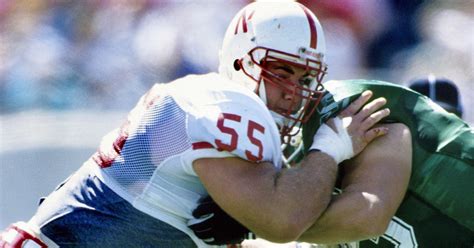
Excerpted from Chapter 93, No Place Like Nebraska: Anatomy of an Era, Vol. 2 by Paul Koch
The “Red Death” had long devastated the country. No pestilence had ever been so fatal, or so hideous. Blood was its Avatar and its seal –the redness and the horror of blood. There were sharp pains, and sudden dizziness, and then profuse bleeding…
-Edgar Allen Poe, The Masque of the Red Death
Poe’s words above mimic the travails of many opposing quarterbacks from the 60 & 3 era: all bloodied, bent and bruised victims of a certain wild-man plying his trade. A century and a half before Christian Peter arrived on the Nebraska Football scene, it appears the author had a ghastly premonition of the young man with his tale of the cholera contagion of that day known simply as The Red Death. With the young Mr. Peter seemingly in mind, Poe continues: “..His plans were bold and fiery, and his conceptions glowed with barbaric luster. There are some who would have thought him mad. His followers felt that he was not.”
Barbaric luster? Some thought him mad? Now, there’s an apt description of the enigma known as Christian Peter. A workout warrior both maniacal in his menace and the provocateur of his peers, Christian was to many the hammer that pounded the nail. And there were quite a few he left bent: Kansas State’s QB Chad May notoriously coming to mind. In Robert Bork’s erudite tome Slouching Towards Gomorrah, there is the statement, “Every new generation constitutes a wave of savages who must be civilized by their families, schools and churches.” None more so than a boy who went by the name of Christian.
Our last interview with the Jersey/Nebraska connection, I finally captured his attention a full year after making first contact, an effort well worth the toil. Let’s hear what he reveals in looking back on the part he and others played leading up to -and during- that bloody and breathtaking Blackshirt era of plague, pestilence and terror…
Notable quote #1:
“I simply did what I saw. I was very fortunate when I came in, there were leaders: John Parrella and Kevin Raemakers. These were guys who didn’t talk a lot. These were guys where their actions spoke louder than their words. And the bottom line is, productivity and setting an example and leading? The only way you can do that is just by doing, not by talking. It’s contagious.”
Christian Peter
Scholarship recruit, Defensive Tackle, Locust, New Jersey (Middletown South)
Where are they now? Atlantic Highlands, New Jersey, Insurance Rep
Q: Christian! It’s great to hear your voice, man.
Christian Peter: Thanks. And you, too. I’m in the insurance business: Health insurance.
Q: You’ve been a busy man this past year trying to figure out what’s going on with the White House’s plans, eh?
CP: Just don’t ask me any health insurance questions. (laughs)
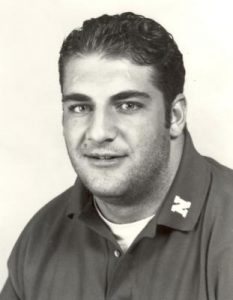
Q: So how is your health?
CP: Oh, not bad, I guess. No issues. I get up every morning and some days are better than others, but I’ve got nothing to complain about.
Q: So what year was your first fall camp at the University of Nebraska?
CP: 1991.
Q: Tell me, how does a kid from Locust, New Jersey end up at Nebraska?
CP: It was Frank Solich. I just liked Frank. I got along with him the first time I met him. He gave me his word he’d take care of me, and he did.
Q: So many of his running backs describe him in one word: intense.
CP: Oh yeah, he was definitely intense. And there was no comparison to other schools. It was either Nebraska or Temple, the only two schools who wanted me. And it was kind of a no-brainer as far as the decision I had to make.
Q: Do you recall who your chaperone was on your recruiting visit?
CP: Yeah, I had a guy by the name of Terris Chorney.
Q: Terris, the Canadian center?
CP: Yeah, for some reason Terris sticks out.
Q: So you were a D-line prospect from the start?
CP: Yes, D-line.
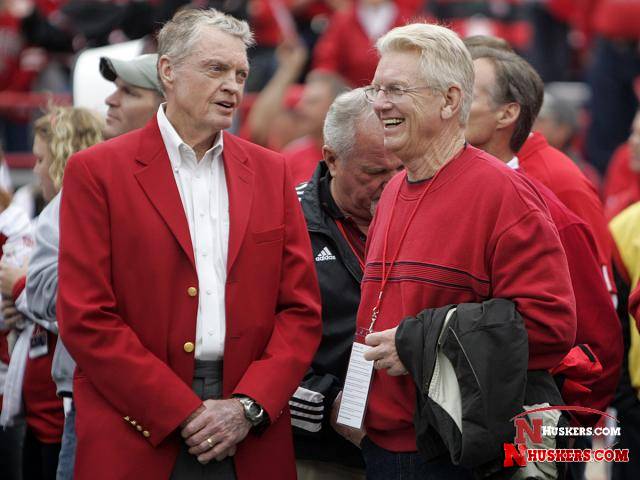
Q: I would suppose you got to meet Charlie McBride pretty early in the process?
CP: I did. I met him on my recruiting trip out there. Met all the coaches. With my first meeting I was pretty nervous and intimidated. Just the fact that I was talking to a Nebraska football coach was a little overwhelming for me, because I didn’t know much about them. All you knew was the wonderful tradition and history the football program had, and I guess that’s why I was a little nervous and taken aback.
Q: Now, did you redshirt?
CP: I was a Prop 48, so I was academically ineligible.
Q: I suppose that year out of action was eating you up inside.
CP: I’m sure it was, I can’t remember. But there was probably a little discouragement not being able to play my freshman year. But I hit the weight room hard and got an opportunity to meet some of the guys who were playing and developed some friendships and relationships with those guys.
Q: Do you recall any of the first guys you did meet, any guys who took you under their wing?
CP: I was very fortunate that the D-linemen were a pretty close-knit group of guys, and a lot of those guys really took me under their wing: Kevin Ramaekers, Terry Connealy, John Parrella.
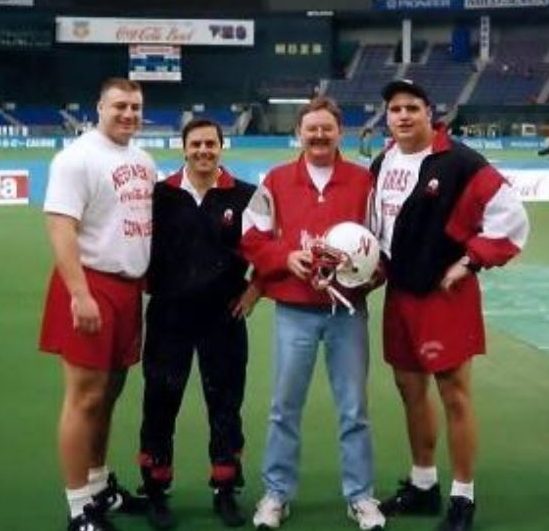
Q: Was Pat Englebert still playing?
CP: Yeah, he was a senior…
Q: So was there anything about the culture, the Nebraska people, that threw you for a loop?
CP: Just how nice they were. I didn’t know if it was real or fake.
Q: You didn’t know if they were still trying to ‘recruit’ you?
CP: Yeah. (laughs) The people out there are just so nice and genuine and loyal. Not that we don’t have that out here, it’s just I guess I was a little bit guarded and just wasn’t sure that people could really be that nice. And obviously, over time, I found out they were.
Q: So, from the start did you have aspirations of playing in the pros or were you simply content to be playing college football and not looking too far over the horizon?
CP: I think you always have dreams. The reality of it was, I didn’t know if I was good enough to make it (in college football). I had played one year of high school football, and Nebraska took a chance on me. You dreamed of it, but the reality was I never really played too much. So I just wasn’t sure if I could.
Q: I’ve got to ask, why only one year of high school football?
CP: I was at a couple of different schools, and they didn’t have high school football.
Q: So you were pretty raw?
CP: Correct.
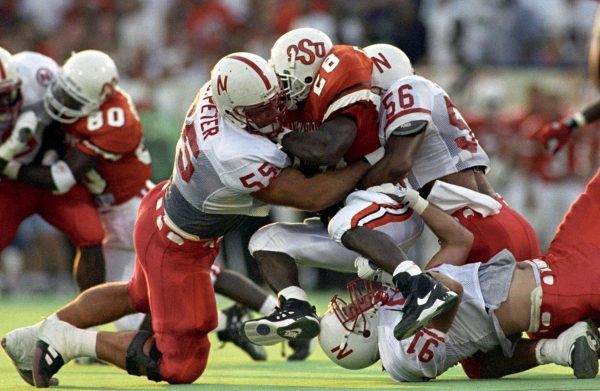
Q: Do you have any idea how Frank found out about you, since there probably wasn’t much game film on you?
CP: Nah, there was a scrimmage film he picked up. He saw something on there, maybe some ‘potential’ or whatever you’d call it, but it was enough for them to take a chance on me.
Q: Would it be fair to say you had a pretty good ‘motor.’
CP: You know, I was always taught that good things happen to people who work hard and are relentless and stay after things. I think I was taught that at at an early age by my parents.
Q: So when you arrived on campus, did anything about the organization stand out to you?
CP: Everything about the program was first class. Whether you’re talking about the athletic director, the academic support program, the coaches. I don’t know whose responsibility it was to put together those teams, but it seems like each one of those teams there had individuals who cared for the players and not just what they did.
Q: I’m sure you’d met a lot of people later on in the pros who’d played at other programs. Were there great differences when it came to each person’s college experiences?
CP: You know, I’ve spoken to guys who played at other major division one universities, and some have had similar experiences. And others thought I was joking when I told them about my experience at the University of Nebraska.
Q: Like it was too good to be true?
CP: Exactly.

Available on Amazon.com
Q: Well, in my interviews for this project I’m getting the sense that the words ‘family’ and ‘respect’ are pretty accurate in describing the organization of those days. Would you say those words fairly accurately describe the program?
CP: Oh, absolutely. Again, I know the guys cared for one another. It wasn’t just a part-time job for us, it was full-time and it was all year round. And when you’re with somebody for that period of time, relationships evolve. All that develops. And we had that.
Q: Who were your roommates most of the time?
CP: It was Kevin Ramaekers, and then my brother Jason and Brian Nunns.
Q: Hey, do you work out with Nunnsy very often these days?
CP: Well, Nunnsy’s in Jersey, but I don’t get a chance to see him too often. He’s up in North Jersey. I don’t know the last time I saw him in a gym.
Q: So are you still in decent shape?
CP: You know, I’m getting a little bit older and it doesn’t come off like it used to, that’s for sure.
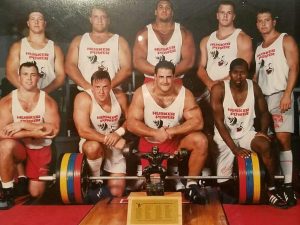
Q: Getting some gray hairs, are you?
CP: No, no gray hairs. I still have my hair. Nothing gray, but a lot of stress. You know.
Q: Doug Colman, another Jersey guy, said that it took him about a year or so, but he eventually came alongside and became a ‘Nebraskan,’ so to speak. He said the spirit of the team broke into his heart, playing for Nebraska rather than merely at Nebraska. I don’t want to put words in your mouth, but did you also find yourself beginning to identify less with yourself, personally, and instead more with the team and the state?
CP: I can definitely identify with what Doug was feeling. There was something much bigger than each individual who played on that team. And it’s about the program, about the tradition, about everything it stands for. No one person makes the place. It’s a combination of everyone who’d been there and contributed to making it what it is today.
Q: Delving into leadership dynamics, Christian, your name has come up frequently. I’m not sure if that embarrasses you or not, but it seems the name Christian Peter always comes up when team leadership is spoken of. Feel free to toot your own horn here… where did you get your concept of being a team leader?
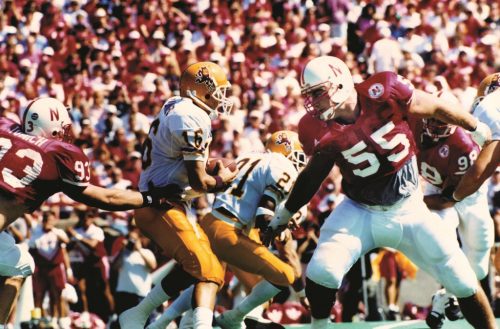
Against Arizona State, 1995
CP: I don’t know where that came from, and it’s not something I feel comfortable talking about. The fact that I was mentioned with that? It’s an honor. It’s something I don’t feel I deserve, because I simply did what I saw. I was very fortunate when I came in, there were leaders: John Parrella and Kevin Raemakers. These were guys who didn’t talk a lot. These were guys where their actions spoke louder than their words. I was just fortunate enough to be around these guys, and that’s all I knew. I think people respect others who, rather than talk the talk, they walk the walk. They let their actions speak louder than their words. And the bottom line is, productivity and setting an example and leading? The only way you can do that is just by doing, not by talking.
It’s contagious. When people see other people working hard, it almost sets the tone. You have two options: you can work just as hard or harder, or you can fall by the wayside. The time I came in, we were very fortunate to be around guys who provided their leadership for us and set an example. I don’t want to make it more complicated than it is, because it’s pretty simple: we were fortunate enough to be around guys who were workers. And I think we were the ones who benefited most because, obviously, we reaped the benefits and we got our championships. But a lot of that is owed to the guys who taught us how to practice, how to play. Unfortunately, they weren’t officially part of the team anymore, and even though they don’t have those rocks they were just as responsible for creating those championships as the guys who got the jewelry.
Q: So their legacy was your collective future performance?
CP: Yes. Basically, it was their hard work that paved the way for us to capture those championships.
Q: And branching off of that, let’s say it’s the summer of ’94 and you guys stepped it up a level -we had the minute-sixteen on the clock and such- what was it that drove you and motivated you to push beyond your normal efforts that summer? What was your primary motivation?
CP: I remember when we first came in, specifically. I think we were labeled as the worst recruiting class in the history of Nebraska football. Fortunately the majority of us who were able to stay with the program, we kind of took that personally. We always had the reputation of not being able to win the big one, where we’d go undefeated through the Big 8 and then getting down to the bowl game and losing to a fast Florida team or something like that. It was always something that stuck with us, and we had something to prove to everyone as well as, I think, the guys took it personally.
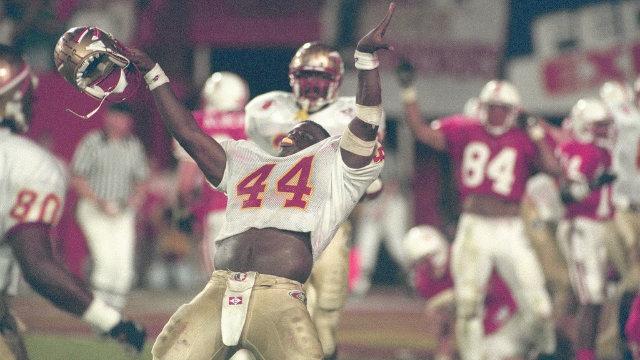
I remember going down there in ’93 and still -that’s still a tough pill to swallow- that ’93 championship game. But I remember, as bad and as painful as it was, we knew what it took to get there in ’94. After that game, I think it was a couple of days later, guys started rallying up and getting into the weight room and offseason conditioning and stuff like that. There were no coaches involved, we just did it on our own. It was just something where nobody had to say anything to anyone, nobody had to fire anyone up, no one had to get anyone motivated. That’s who we were. That’s what we did. It all came together at once and ‘94 was a lot of hard work went into that team, but in the end it paid off. We did what we were supposed to, we listened to our coaches and we worked hard, and the end result was the national championship.
Q: Speaking of group dynamics and demographics, what did you guys from Jersey bring to the team? You, Doug Colman, Ernie Beler, Barron Miles, was there anything specific from a New Jersey, a geographical perspective?
CP: You know, I have to make it clear, and crystal clear: this was a Nebraska team. There are no outsiders who make that team what it is. You have two options: you either fall in line with the guys who grew up there and really know what Nebraska football is like or you don’t make it. That’s what I first saw when I came out there, the in-state guys, “This is what the program’s about…” At such an early age they are rooting and cheering and their lives revolve around Nebraska Football.
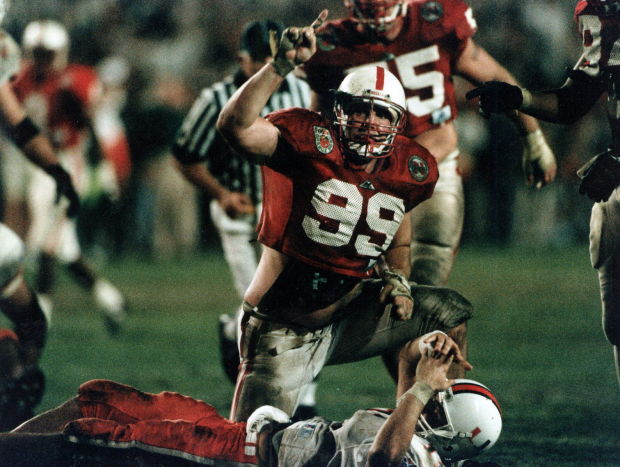
The sacrifices and the dedication that these guys make for the Nebraska program? I learned what it meant to be a Nebraska Cornhusker through guys like Terry Connealy, Kevin Ramaekers, John Parrella, Mike Anderson. Those are the guys who make the program what it is. It’s the out-of-state guys, we’re just very fortunate to be a part of that.
Q: I figured some Jersey-attitude might have added to the special mix there…
CP: Well, maybe it is. Maybe the guys who put the puzzle together, being Coach Osborne and his assistants, they knew what they were doing. They knew where to shop to find what they needed.
Q: “Knew where to shop.” (laughs) That’s a good way to put it. So tell me, how would you describe Charlie McBride? What words would best describe the man and his methods?
CP: Probably one of the most amazing men I know.
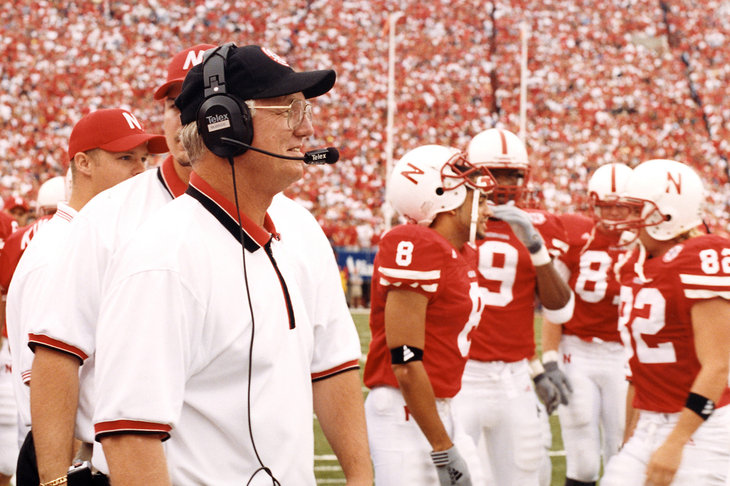
Q: In what way?
CP: It’s a combination. I didn’t like thinking of coach simply as ‘Coach,’ because he’s so much more to the guys who played for him than just ‘Coach’. Calling him ‘Coach’ is not even half the picture. He’s somebody who took us under his wing and treated us like a son.
To be continued….
Copyright @ 2013 Thermopylae Press. All Rights Reserved.
Photo Credits : Unknown Original Sources/Updates Welcomed
Author assumes no responsibility for interviewee errors or misstatements of fact.